Tuesday, February 28, 2006
Some Common Trends
Now of course each of these families has been forced to deal with an extremely traumatic situation on a number of levels. First, imagine knowing that you're loved one was going to die - like a terminal illness except that there's nothing wrong with them. Then, imagine that you could barely see them, and when you did had to go through invasive searches, be viewed with suspicion, and see them in a de-humanizing and degrading environment. I thank God that I have never had to discover whether or not I possess the strength that these families have summoned.
And while every family, and every person, deals with this experience in their own way, there are some common themes that I've seen already emerging. The pain that these families feel is, of course, obvious. To have their loved one facing death and reviled is a horrible experience. Moreover, to know that their brother/sister/son/daughter/husband caused that kind of pain to another family is hard. And this has lead to a feeling of guilt, wondering if they could have done anything to prevent it, or if they should have testified or said something different when they did to move the jury. "Could I have saved them?"
Sadly, there are other, more insidious, trends that I've had to see, and the biggest of them is ostracism. Our society has tended to blame these families for their loved ones. Family members have told me of losing jobs when people recognized their names, of being excluded from social groups, of having to move because of hostility. And being told that their grief and concern for their loved one is unimportant.
Meeting with a family recently, one of the members told me that they had always previously supported the death penalty in the past, but that they thought life in prison might punish the offender more. It might, I'd hate to speculate, but the death penalty certainly punishes their family more. These good people are the hidden victims of the death penalty system, and we as a society have done nothing to look out for them.
Monday, February 27, 2006
How Hitch-Hiking Imitates Organizing

So I spent Friday afternoon and night hitching from Nashville down to Mobile, and I should make it clear, at this point, that this was a recreational trip - TCASK does not force it's employees to hitch hike for work trips. But over and over again the similarities between our outreach work and trying to get rides struck me, so I thought that this would be a good time to share.
To begin with, in a lot of ways, the goals are similar. In both cases we are trying to build a relationship of trust with people, either to get them to share their time and stories with us, or to get them to trust me enough to let me into their car. And we're doing it for a purpose, a strategic goal (get to Mobile, abolish the death penalty, etc.)
Now some quick tips.
1) Have a goal- in my case this involved a sign which read "Mobile or Bust" but when we organize people we need to know what our ask of them is. Is it a ride down the highway, a donation to our organization, a signature, a moratorium resolution, or what?
2) Presentation matters- when I hitch, I do not dress in my ripped jeans and t-shirt and forget to shave. In fact, I was wearing a nice sweatshirt and kackis, as well as being cleanly shaved and clean cut. Every person who picked me up explained that they usually wouldn't but I looked nice and unthreatening. So when we go to speak to people, dress respectfully and make sure that you are demonstrating that you're ask is attractive.
3) Be nice- I always smile at cars and wave if they smile back, even if they don't pick me up. Why? There are a lot of reasons- one it will help keep you in a good mood. Two, the car behind might notice and be more likely to pick me up. So always be nice, even when people don't respond to your ask. It isn't necessarily because they are bad people, they may be busy, or not going your way, or they might have friends that might help you if you're polite.
4) Be patient- It took me an hour and a half to get my first ride out of Nashville, and it was getting hot and discouraging. But that ride took me an hour out of his way and bought me dinner just to be nice, then I got three rides in a row with hardly any waiting. Things won't always happen at the pace we'd like, but we to work with the opportunities and people that we have, so just keep plugging and we will get there. I've never failed to reach a destination that I've set out to hitch to, and organizing works the same way. That being said. . .
5) Be strategic- Find good exits with long on ramps and a lot of traffic. In other words, to reach our goals, go where the people are to maximize your chances of success.
6) Have fun. Never take yourself to seriously. Remember to laugh at the fact that you're standing on the side of the road with your thumb in the air or that you're trying to abolish the death penalty in the South. Remember that the lady who said that it's OK to execute innocent people, because "they shouldn't get themselves in the position to get in trouble to begin with" is funny, and be prepared to laugh. It'll make the next people more likely to pick you up because you're having fun and the work looks fun too.
So, (just for Amy) I'll stop short of encouraging everyone to hitch hike somewhere, but I hope that my little analogy was a fun one and may help. It may also say something that this is what I was thinking about on my trip. In any case, let's all get out on the road (to abolition).
Saturday, February 25, 2006
slake your thirst where the water is
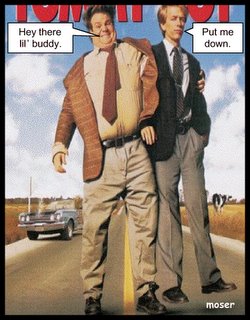
we were talking with a parish council president the other about moving our office into their parish center ... he was, i believe, trying to figure out whether or not the space was suitable for our work when he asked, "do you do most of your work in the office," or maybe it was, "do a lot of people come to your office?"
either way the answer is no -- most of our work, now, is done "out there" or at least the important work of organizing is done "in the trenches" all across the state...
why??? ... two things -- people will rarely come to you unless you're giving away cash and you have to "meet" people where they're at ... figuratively and literally ...
to, as the lil' jesuit dude might say, git 'er done, you have to find people who have at least a nominal interest in the issue, and sell them on the idea that you have a plan on how to impact that issue, and that they can play an important part in making change happen on the issue...
and we have to do that on their turf not on ours ... we have to meet in their faith communities, their shoney's restaurants, their libraries, even their living rooms but it has to be theirs ... they need to feel comfortable getting to know us as people, learning where the issue is at in the public arena and why, and seeing tcask as the vehicle that we can drive to victory ...
so that's why we set goals for numbers of presentations, numbers of addresses (e-mail and snail mail) added, numbers of calls made, and numbers of new members -- so that we consistently remind ourselves that it's about gettin' out there in carroll, giles, bradley, overton, jefferson, and all the counties of the state to do the hard but fascinating work of meeting new people, learning what their lives and communities are like, and empowering them to teach their neighbors, friends, family members, co-workers, and sometimes their clergy about how wasteful, random, and futile the use of the death penalty is...
water won't find you when you're thirsty and the people who will eventually flex their collective political muscle and bring down the archaic tool of capital punishment won't come to us if we're always hanging out in the office...
Friday, February 24, 2006
. . . And Brutus is an honorable man

But in all seriousness, oratory and rhetoric are often overlooked as important parts of our abolition arsenal. We may make the best points in the world, but if we don't communicate them effectively, we won't convince our audience. Which brings us to this entry's title. Any Shakespeare fans in the house?
You see Mark Anthony's speech ("Friends, Romans, Countrymen, lend me your ears!") Is a great example of oratorical rhetoric. How do we get our points across? Anthony has a repeated phrase that he comes back to over and over again, "but Brutus says he was ambitious, and Brutus is an honorable man." Over the last few days I've been privileged to speak with Hector Black (a MVFHR member) and Stacy Rector (a Presbyterian minister). Consequently, my presentation was no longer the moral one, moving people's hearts. Instead I had to retool my presentation to focus on the nuts and bolts facts. So I decided to rip a sheet out of good ole Willy Shakespeare.
"Does it work?" I've been asking my audiences. Before we answer that question, we have to know what "work" means. Is it always getting the right person? Well, with over 120 exonerees in the last 30 years, no it doesn't. So does it work? Well maybe if it protects us, but with LWOP we don't need it and with no serious study showing any deterrent effect, it doesn't so, does it work?
I've had pretty good results with this rhetorical question being used as a refrain to get the point across. We all know that the death penalty, as a public policy, is a failure, but we need to find the best ways of communicating that message. When we're putting together a presentation, ask yourself, does it work?
Thursday, February 23, 2006
build me up buttercup...

unless you hang around the tcask office (lessee, that's 6 billion of you i'm excluding off the top of my head) you probably don't know that alex's petname around here is buttercup...
why??? beats the heck out of me xactly' but that's alex and i'm muffin ... but i digress...
but buttercup came thru today and i want YOU to know about it - ya see, he got our bill "dropped" today and well, the poor lil' jesuit dude was feelin' a little harried ya might say, wonderin' if we would have an actual bill to support for both our letterwriting day on mar
 ch 1st and out first ever justice day on the hill (to direct lobby our elected officials)...
ch 1st and out first ever justice day on the hill (to direct lobby our elected officials)...he actually got representative beverly marrero (d-memphis) to drop the bill ... and then she called our office with some advice and kind words - what a gem!
now i'm told that the lyrics to build me up buttercup actually talk about someone who pumps you up only to let you down but our buttercup never let's us down --- so while the song may not reflect his actual value and the fondness we have for him it won't stop us from raving about our own buttercup - the lil jesuit dude from nyc...
Wednesday, February 22, 2006
On Messengers and Stories

Now Hector is, by the account of basically every person who has ever met him, the sweetest and gentlest man in the world. I exaggerate not. Ask anyone. He is also the father of a murder victim. I'm not sure that I could do this, but Hector spoke at the trial of his daughter's killer against the death penalty and continues to do so today. His story is one that I hope that every person gets to hear at some point. We have more to learn from this man about the true nature of love, compassion, and forgiveness then we probably could given a life time. It was truly an honor to share a podium with him.
And it makes the rest of our lives easier. Once Hector had spoken, the audience was mesmerized. His story and the wonderful gentleness of his personality carries over incredibly to everyone who hears him. They were hooked.
On the other hand, I had to follow that act. I could have given the "I Have a Dream Speech" and people might not have noticed. Trying to bring it home after Hector speaks is like trying to perform after John Coltrane (or some band that's hip nowadays). I should have just recited the alphabet and sat down.
So why have me speak at all? We never should underestimate the power of stories, and Hector's is a great one, and the messenger who carries it could not be better selected. But we need to let him tell his story. That story has all the power to move people. But we all don't have those personal stories and once we've moved people's hearts, we need to move them to action. That's where this kind of pairing can be so effective. Tell the story and let people be moved. Then have someone else tell them what they can do with that movement. How to strategically act on the incredibly call we receive from messengers like Hector and all the men and women who work with MVFHR, MVFR, and the Journey of Hope. Let their stories provide the engine to move people, all we need to do is make sure that the most effective track.
Tuesday, February 21, 2006
Wait! The Legal System Can Make a Mistake??
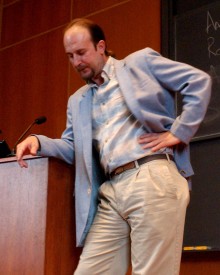
The following piece came across the AP news wire today. Sadly, many states still refuse to apologize and/or acknowledge when they make mistakes and convict innocent people- even when those people are sentenced to death. Fortunately, Arizona has taken a bold step and offered an apology to Ray Crone (pictured right) the 100th death row exoneree.
Even though the state of Arizona has finally done the right thing (at least to a small extent) by Krone, we should remember two things: there are over 120 other exonerees out there, many of whom have not been treated nearly so decently, and the presence of so many exonerees clearly indicates the very serious problem with the death penalty system, i.e. that it pulls in the innocent as well as the guilty. There can hardly be a better reason that we need a moratorium NOW.
The York, Pa., man had spent 10 years in prison in Arizona before DNA evidence cleared him.By Paul DavenportAssociated Press
PHOENIX - Arizona legislators apologized yesterday to Ray Krone, the York man who spent a decade in prison, including time on death row, before DNA evidence exonerated him of a 1991 killing in Phoenix.
Members of the House and Senate stood and applauded Krone as he was introduced in each chamber's visitors' gallery during floor sessions. Seven of the 90 state legislators also individually apologized to him during a news conference organized by the Coalition of Arizonans to Abolish the Death Penalty.

Rep. Phil Lopes, leader of the House's Democratic minority, said the apologies represented an attempt to make amends to Krone.
"Ray Krone's case exemplifies why we should abolish the death penalty," Lopes said. "Now is the time."
Senate Judiciary Committee Chairman John Huppenthal told the Associated Press that he still supports the death penalty but believes Krone's case shows that corrections are needed to protect the innocent.
"This is happening more frequently than we would like to admit," Huppenthal said.
Krone, 49, said before the news conference that he welcomed the apologies. "It's a recognition from actual elected officials of the wrong that was done in the name of the State of Arizona," he said.
Krone was wrongfully convicted twice of killing Phoenix bartender Kim Ancona based largely on expert testimony that purportedly matched his teeth with bite marks found on the victim.
In 2002, DNA testing proved Krone wasn't the killer. Crime-scene DNA was linked to a man already in prison for another crime, and Krone was freed that year after 10 years in prison, including two on death row.
The man now implicated in Ancona's killing, Kenneth Phillips, awaits trial in Maricopa County Superior Court.
After his release, Krone filed a wrongful-conviction lawsuit, winning settlements of $3 million from Phoenix and $1.4 million from Maricopa County.
Krone has traveled extensively to speak against the death penalty and advocate DNA testing.
"Those 10 years must have been for a purpose," he said. "No system is 100 percent accurate."
Monday, February 20, 2006
Failure
Thursday was the last day for unlimited bill introductions in the Tennessee State Senate. From now until the end of session, each Senator can introduce only nine bills, so if we wanted a moratorium and study bill in the Senate this year, we needed it to be introduced before Thursday. Unfortunately, despite spending the better part of several days on the hill last week, and having some terrific meeting with legislators, I could not secure a Senate sponsor for our legislation this year. This may make it difficult for us to get the bill introduced in the House as well (the House deadline is this week).
Now, in the end, this is not the end of the world. We had never hoped to pass legislation this year, which is one reason that legislators are unlikely to pick up the bill. Why sponsor something that isn't going anywhere? And he has done almost no work on the issue in the legislative field, so the ground had not been softened. With or without a bill, we'll be spending significantly more time this year on the hill to begin educating our legislators about the moratorium, but it certainly would have been a great start to have sponsorship secured in both houses the session prior to our attempting to pass legislation.
So, we take the failures as they come. A new provincial of the New Orleans province of the Jesuits once spent a day meeting with all the groups doing work in his province, working for living wages, health care, just treatment for immigrants, care for the homeless, children's services etc. At the end of the day, the provincial congratulated all of them on their hard work and informed the that it would all fail. Failing is a part of life, especially working for justice, swimming against the current of society. I believe very deeply and honestly that we will soon abolish the death penalty in Tennessee. I believe that we will see a moratorium enacted in a few short years, but we will fail many times along the way.
"Do you know what separates the winners from the losers, kid?" Gene Hackman asks Keanu Reeves in "The Replacements," a movie I will grudgingly admit to enjoying.
"Yeah, the score." Reeves replies. Hackman smiles and shakes his head.
"It's getting back up on the horse after you've been kicked in the teeth," he says.
Sunday, February 19, 2006
But I WANT to go to work!

But, OK, things are a little different down here. Snow is a much bigger deal and we did have some snow this last weekend. Unfortunately, TCASK also had our quarterly state board meeting on Saturday. On Sunday morning, I was supposed to drive to Memphis to give a talk and a sermon, but on Saturday morning, I got a call saying that we weren't going to have a quorum in attendance, so the board meeting was off.
Sigh. Well now, what am I going to do with myself today?
Enter the telephone again. And it's my contact in Memphis saying that they expect a very small turnout for worship on Sunday, because of all the ice, and it probably isn't worth my making the trip, so in the span of a couple of hours I went from having a nice full weekend with lots to do, to being completely free. WHAT'S GOING ON HERE!?
But, as I remarked a few days ago, even as the most conscientious organizers, we can't possibly plan for everything (which includes, it turns out, the lack of travel through snow). On the upside, on Friday afternoon, we had a car break down here, so I wasn't able to get a lot of the work done that had been sitting on my desk all week, and I suppose, since I have to on the road three days next week, having a weekend to relax and catch up on some work isn't the worst thing ever.
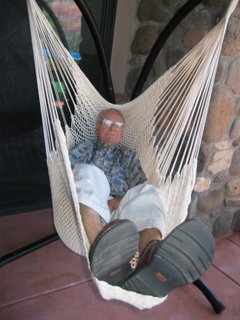
So, I hope that everyone had a good weekend. I did my best to take it easy (I mean I didn't come into the office until Sunday afternoon- that's pretty good, right?)
Hope y'all come back re-energized for abolition work, because it's a long road ahead of us (though not as long as we may think sometimes)
Friday, February 17, 2006
citizen-lobbyists or a tale of two cities continued...

often when we hear the word "lobbyist" we think of the jack abramoffs, scandals, and insider deals cut with legislators ... and this is, clearly, one side, the seamier side, of lobbying ...
but i think that part of the blame rests with you and me - the regular gals, guys, and whatnot out on the streets here in tennessee ... you see, we have too often accepted this particular vision of what lobbying is and fail to accept that we - you and me - are just as capable, and arguably essential, lobbyists in a democratic society ...
i witnessed and was part of an alternative model last monday (february 13th) ... in nashville, at the friends meeting house in mostly segregated north nashville, some 60 regular work-a-day people gathered to learn about and prepare to be lobbyists...

the 60 people gathered looked like a real cross section of the city - anglos, african and caribbean americans, latinos, the physically challenged, lgbt members, english and spanish speakers - and we had the nashville peace and justice center to thank for bringing us together ...
we heard from a now and afl-cio lobbyist on the general principles and from people like myself on specific issues and the key points to make ... on the 14th and 15th us regular josephines met with state senators and reps, always with an issue coach, and made our views and our presence known...
140 miles away the little jesuit dude was training people in chattanooga on these same principles, taking the awe and mystery out of the process and act of lobbying and prepared tcask members and supporters to be more comfortable with the process and develop some self confidence (legislators put on their hanes our way the same way we do)...
abolitionists have to know that simply being issue activists isn't enough to change public policy - we also have to be issue advocates ... and to change public policy we need legislators to know that their voting constituents will back them up and even reward them for taking sensible, principled steps including, eventually, doing away with capital punishment altogether ...
towards that end tcask will host its first ever lobby day (justice day on the hill) march 29th -- and we aren't gonna be perfect or build rome in a day ... butcha know what??? who cares - we're gonna wade right on in, get our feet wet, take in the experience, process the good and the bad, and use that to help us in 2007 and 2008 as we push towards moratorium and study legislation passing in tennessee...
ya heard it here first...
peace out - <3
Thursday, February 16, 2006
It's Not Our Place
(I should make it clear here, in interest of full disclosure, that this is not an argument that I've come up with on my own, the United Methodist, Presbyterian, Catholic, Episcopal, Lutheran, Unitarian Universalist, and any number of other churches have made it previously)
But last night, I had to be reminded of my own message. You see I was scheduled to speak at two churches in Clarksville last night, but during the afternoon I got a call from one informing me that a parishoner and minister from a nearby parish had died and that people would be attending his viewing, so that the talk would have to be rescheduled.
Later in the evening, when I arrived at the second church, I found that the man who had died was a parishoner there, and the vast majority of what would have been my audience was also attending the viewing.
Now I enjoyed the talk, nonetheless. We had a small audience but they were wonderful people who asked insightful questions and it was a pleasure to speak with them, but it's good to remember that, as prepared as we can be, as organized and as well-planned, sometimes things happen and we simply can't do anything about it. When we learn to accept that there are things we can't control, our lives get more pleasant. So I'll talk to fifteen people instead of fifty. There's nothing I can do to change it. Just try to give the best talk that I can, regardless of whom I'm speaking to and. . . of course. . . make sure to follow up so those fifteen people tell their friends that, wow, that little jesuit dude was interesting, we should have him back to speak to the whole church! If we can turn the little setbacks into opportunities, then we can git 'er done.
Government Officials BEWARE. . . the TCASK Blog is Here
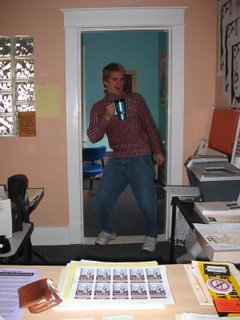
About 30 minutes ago, I was listening to the immortal Gloria Gaynor sing "I Will Survive," and dancing around the office. And I don't mean my personal office, I mean the whole building. You see, this is kind of a victory ritual for me, here in the TCASK office.
What was the cause for celebration today? Well, when I checked our web traffic today, I found that we had a visitor to the blog from the search engine metacrawler. And what led this person to the TCASK blog? Well they searched for "Al Schmutzer" and the second link that came up was the one below: http://tcask.blogspot.com/2006/01/institutions-and-district-attorneys.html
You see, D.A. Schmutzer had spoken at UT Knoxville a few weeks ago and claimed that the death penalty was not racially skewed in its application, but wait, our blog responded, of course it is.
On Monday of this week, former Attorney General John Ashcroft, speaking at Vanderbilt University, claimed that the death penalty functioned as a deterrent. You can read the TCASK response in the entry below this one. Now we at TCASK are all in favor of serious discussion about a complex issue, but our government officials owe us honesty, and they should not come onto college campuses, where we should be looking for truth and fact and make statements that all factual analyses prove to be erroneous. So never fear, seekers of truth and justice, the TCASK blog is here. We will not allow these sorts of comments to go unchallenged. Someone looking for information on Al Schmutzer has already found this out, and I hope that a search for John Ashcroft and Vanderbilt will yield us a result as well.
So you keep reading and we'll keep holding our government accountable on the facts! Thanks to all.
Wednesday, February 15, 2006
Who Do You Think You're Fooling?
In particular, Ashcroft spoke about the utility of capital punishment as a deterrent. Believe it or not, this former high-ranking government official said that the death penalty was a deterrent "if not statistically, than at least anecdotally" (emphasis added). Anecdotal evidence? Every legitimate study of the death penalty ever done has found absolutely no deterrent effect.
The deterrence of the death penalty has, to most reasonable minds, ceased to be a credible argument. The states without the death penalty have a generally lower murder rate than those which do execute people. We have not seen a spike in murders after a state abolishes the death penalty, nor have we ever seen a decrease in the murder rate after a state reinstated the death penalty or after it's first execution. The only thing we have seen is an increase in violent crime after a highly publicized execution, often referred to as the brutalization effect.
Ashcroft also referred to the death penalty being "necessary" to protect other prisoners and guards from these individuals supposedly unable to stop killing. This is the newer argument about specific deterrence. In other words, if we kill person A, that person will not kill again. Of course, this argument falls apart a little, when you consider 1) that we have sentences like life without the possibility of parole (LWOP) which ensures that a convicted murderer will never be a danger to the public again and 2) that we have supermax prisons which practically ensure that a prisoner cannot hurt anyone. And all of this at a lower cost and without the risk of killing innocent people.
So really, who does Ashcroft think he's kidding? Everyone who has studied the issue knows that the deterrent argument in regards to capital punishment doesn't hold any water, so we're forced to referring to "anecdotal" evidence. What, did someone come up to him and say, "Gee, I was going to kill this guy, but then I realized that I could get the death penalty if I did that, so I made him a cake and now we're friends" ?
We should have a serious debate about the use of capital punishment as a public policy tool in America. We should acknowledge that people feel strongly about it. But let's call a spade a spade, and let's be honest about the facts. To do anything less, particularly on a college campus and as a former high-ranking government official, is to do a disservice to us all.
Sunday, February 12, 2006
no wonder the hat rack was invented!

not all non-profit "agencies" are equal and alike...
think about it - pick a non-profit like the heart association ... it's pretty clear that there's a staff and it manages the day to day activities towards achieving annual and longer range organizational goals and there's a board of directors and its pretty clear what their roles are ... and there are pretty clear guidelines on who does what for the most part ... or even what the relationship is between the board and the executive director ...
but what about teeny-tiny issue-based non-profits like a tcask?
i mean, it's just not that easy because, well, in human resource terms we are so few and so are our fiscal and material resources ...
and issue based non-profits, particularly in their youth, almost always have activist board members and here's where the confusion can really creep in - transitional growth periods ...
consider, in the early days an organization like tcask can be (was) an all volunteer organization ... if the board (or in tcask's case steering committee) members didn't also do the work of the organization then, well, nothing would get done! job roles are irrelevant in that context - division of labor amongst board members is what matters ...
but if you are fortunate enough to survive this lean period and hire staff then the role of board members should begin to narrow and if your staff grows to 2 and beyond the necessity to shift in
 to more traditional roles becomes yet another survival imperative ...
to more traditional roles becomes yet another survival imperative ...but is that easy??? heck no - just ask the american male who thirty years ago in his 40's received the word from his wife that a joint checking account was an idea whose time had come!
change is hard ... letting go of learned behaviors is hard ... growth and success are, paradoxically to some, hard to manage...
where at one moment you may have been wearing carmen miranda's fruit basket as a hat you may need to wear something more sensible, more focused, more traditional in order to get er' done in a way that creates the most opportunity for success...
knowing not only what hats there are but when to wear each one and to what end is quite a challenge ... but with an approach embracing flexibility and honest communication change can open doors to realizing the art of the impossible ...
like abolishing the death penalty in tennessee ...
<3
Friday, February 10, 2006
Flexibility

It's an under-rated asset really, but to be effective we, as individuals and as an organization, need to be like this guy right here (Is that even possible or is it a trick photo?)
It's far too easy for us to fall into our own pre-conceived notions about what needs to be done and how it needs to be done. And we tend to assume that everyone is on the same page, so we can all just slouch over in the same positions and not try to put our legs behind our heads.
Unfortunately, the world just doesn't work that way, and sometimes we have to be able to change our posture. A great example of this came about a day ago here in the office when Randy and I sat down to discuss what or legislative work actually entails. You see, while we both want TCASK to pass legislation, but also believe that that is only likely to happen if we remain mainly focused on outreach and organizing, the term "mainly focused," it turns out, is not as clearly defined as one might have thought.
Now this all came out of new ethics legislation recently passed by the Tennessee General Assembly, which requires lobbyists to register as such and pay a $100 fee and a $400 tax, and the question was, do I need to do that. Since I do technically get paid to lobby (albeit the $500 cost is about equal to three months of my "pay" as a Jesuit Volunteer) it looked bad. The question was would I be lobbying more than 10 days per session?
Now when I'd examined our position, our legislative partners, our goals in three years, I'd thought that I'd probably be spending easily that amount of time on the hill. Probably more, in fact. Randy had thought that "mainly focused on organizing" called for far less lobbying than that- maybe a few days during the session. So what was really needed?
Back to putting our collective leg behind our collective head. We had to talk about what our roles were, how much time we saw me spending wearing the "lobbyist" hat, how this affected work goals in other areas etc. Eventually I think we came up with an understanding that I'll probably spend more time than Randy originally thought, but probably a little less than I thought, considering the other work that I have to do. But the lesson here was pretty clear for me:
1) Communicate. Even people who are working for the same goals don't necessarily come from the same places and don't have the same expectations.
2) Be flexible. With small staffs, we can't do absolutely everything and your original expectation may not be feasible in light of everything else that is going on. So be ready to change those expectations. There are a lot of ways to achieve a goal.
Thursday, February 09, 2006
on a compelling mix of panel presenters, perhaps???

on february 1st, as part of black history month at mtsu in murfreesboro, tn, a panel on race and the death penalty presented to 53 students ... we had 55 minutes total and i think it was an excellent blend of viewpoints and foci - perhaps there is something to be learned about setting up effective panels...
first, everyone out there in the blogosphere who has been put "dead" to sleep by a boring plenary (or panel) please raise your hand - alex can you count those hands please sir???
1, 2, 3, ...5000, 5001, ... 1,000,000, 1,ooo,001 ... i think the point is made - a boring panel presentation that is well attended can do more harm to your organizing work than calling a sitting attorney general a blood sucking vampire ever will - believe it!
so here was the awesome mix...
professor margaret vandiver from the university of memphis presented on the history of the death penalty, it's relationship to lynching, and its racist application, using newspaper headlines for example, to display the correlation between race and executions, particularly in former confederate states
barrister brad maclean, who is co-counsel for abu-ali abdur-rahman, explained the very important case of mccleskey v kemp...he did a nice job of relating it to the 2 1970's cases that temporarily halted and later resumed executions in the united states and he closed with the poignant observation that executions (extrajudicial or otherwise) served the purpose in the u.s. of the social control of an enslaved, literally, population of people - very compelling
reverend henry blaze spoke from a faith perspective and intimately about community and then linking terror, a buzzword in the post 9/11 u.s., in the form of lynchings as well as racially biased use of the judicial system, inflicted upon the community of slaves and later people of color under jim crow to current dialogues and conversations regarding terror, terrorism, and injustice ... tre cool...
finally, the tennessee dude did his organizer's thing using the case of greg thompson to make his points and his case - very different stylistically from the other panelists ...
in the end it was the variety of perspectives and the very specific niche, or path, laid out for each presenter that kept the audience's interest and made for a compelling "read" as if 4 linked short stories were matched in a nicely bound and published volume ...
so if you're going to do a panel, make it strategic (in this case tied into black history month) and make it interesting like a 4 course dinner so that when the dessert comes out it doesn't simply mimic the appetizer...
now go unpack your metaphors and get busy organizing!
peace out - <3
Tuesday, February 07, 2006
But How Do You Do That!?
So we can build our "people power" in two ways. Method 1: Recruit more people- this is the method that takes me to a different church every Wednesday and most Sundays and a lot of other days too. It's pretty crazy, but we're slowly increasing the number of people moving toward abolition. Method 2: Increase the skill set of the people that are already involved. Which brings me to last night.
I spent last night in Rutherford County conducting a lobby training. We've spent the last few months at TCASK developing a number of these trainings to increase the skills of our membership. We started with a weekend four hour public speaking workshop- that covers how to be an effective speaker, how to structure a presentation, in depth coverage of three crucial death penalty issues, making an ask, and handling tough questions. So far, we've been able to do that training in Nashville and MTSU and hope to schedule it in our other chapters in the coming months.
Our next training was the lobby training. We've started moving toward trainings that can happen on a weeknight, when our chapters normally meet anyway. So our lobby training is a two hour training which includes what lobbying is, Tennessee government 101, the universal rules of lobbying, and the structure of a lobby visit. Then we do a practical workshop to develop our new skills. We're also just finishing up a strategic planning training, which will hopefully fit in the same time frame as the lobby training. We'll go over the process of strategic planning, the key questions to ask, the difference between tactics and strategy, and how we access tactics. Then we'll make a strategic plan for the chapter to follow over the next 6 months or a year.
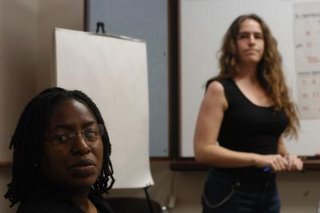
(Above- Shari Silberstein of EJUSA- one of the best trainers around- gittin 'er done)
The point is, that we want our members to be not only highly committed, intelligent, and active people, but also to be highly skilled in the art of political campaigns, and that's what our trainings are about.
And there are a few things I've learned from helping to develop these trainings. The most important is, have people put what they've been learning into practice right there. So, in the end of the speaker's training, participants give a 4-5 minute speech. The lobby trainees come and do a mock visit to a mock legislator. The people doing strategic planning literally make a strategic plan. So, you guys out there. Get together with your local group and lets figure out what training you could most use, and let's schedule it. And if you still find yourself saying "Well, I can't do that." That means that you haven't taken the TCASK training, or we should develop a new training to cover a new skill. And we will.
Monday, February 06, 2006
In Praise of Puddin' Head
 Hats off, gentlemen, she's the greatest! Yes indeed, our board chair, Amy Staples (though lovingly referred to in the office as "Puddin' Head") is simply the best! She's second from the right in the above picture.
Hats off, gentlemen, she's the greatest! Yes indeed, our board chair, Amy Staples (though lovingly referred to in the office as "Puddin' Head") is simply the best! She's second from the right in the above picture.On Friday night, the first annual Concert for Life took place at the Cathedral of the Incarnation. Now this entire event was Amy's brainchild, ever since she heard that we had a JV coming and he also plays the cello. She tracked down Catholic Charities Caring Choices an got them to co-sponsor the concert. She found donations of wine, cheese, and crackers. She found wine glasses. She made up programs. She found most of the acts. She recruited volunteers. She manned the door.
At the concert the awards were given out to the winners of TCASK's first annual Catholic High School Essay Contest, another Puddin' Head creation. Students from around the state wrote essays as to why Tennessee should abolish the death penalty. Amy came up with the idea, put together the packets of information, sent them out to schools all over the state, made follow-up phone calls, solicited celebrity judges, and kept the whole project on track. She even had t-shirts made up for the winners.
Wait, I forgot to mention that, on the side, Amy also teaches a heavy coarse load at MTSU and is in the process of publishing two books. Yeah, TCASK work is her hobby!
So this post is really just to let anyone who doesn't know already that at TCASK we could never do the work we do without the help of a large number of very committed and talented people. As the chair of our board, Amy is a shining example, and I wish every state organization working for abolition a board chair half as talented and dedicated as she is.
Thank God for our Puddin' Head.
Friday, February 03, 2006
Nuts 'n Bolts
Just for instance, this week had been, as those of you who've been keeping up with your TCASK blog reading know, a busy week. And in fact last week was too. We've had a huge event at UT Knoxville, Bill Babbitt in Nashville, and I had a very busy day on Thursday with meetings all over Carroll County and a speaking engagement just outside of Memphis. So, we have met a lot of people and (even more importantly) a lot of new people. I'd like to believe that we've changed some minds and moved some people to get involved. But even if I gave the greatest speech of all time on Wednesday, even if David and Bill moved 300 people to tears last week, if we don't then harness the energy that we generated at those events and get people to take some concrete actions, then we really haven't accomplished much. Martin Luther King Jr. had a dream, but it was a dream that is being brought closer to realization by individual people taking small and concrete steps every day. So on Fridays, when it's time to clean house and clean up my desk, it's time for me to make phone calls, send emails, and work on how to keep people involved and activated.
So I'll be calling Knoxville to talk to our members who did such a great job setting up the Kaczynski and Babbitt program to talk about how we can bring the people that were moved by the speakers into the movement against the death penalty. I'll be writing emails and sending thank you notes to the people that I met with on Wednesday to show appreciation for their time and to remind them of some of the steps that we're going to take together. I'll be following up on leads that our members have sent me and checking in with other members to see how they're doing on our upcoming projects like write-a-thons and film screenings. Because it isn't my standing up in front of church congregations, or Bill speaking to college auditoriums that is really going to bring an end to state-sanctioned murder. It's you writing a letter to your state senator and talking to your co-worker. I'm just here to try to remind us all to keep doing that.
It's Not Too Late
Now don't be scared by a freaky black and white picture of me on the website. I don't really look like that when I play (yes yours truly is playing tonight). But seriously, it should be a fun concert and benefits two good causes- that of abolition and Catholic Charities Caring Choices which provides aid in cases of unexpected emergency pregnancies- so we bring together two central aspects of the Catholic Church's teaching of a consistent ethis of life. It's nice to remind everyone that that ethic extends beyond the confines of the abortion debate.
In any case, thre are (shockingly) tickets still available, so you can call the TCASK office and reserve yours today. 463-0070.
See y'all tonight!
Thursday, February 02, 2006
I Ain't Sayin' He's a Blood Sucker
http://www.wsmv.com/
in which it is revealed that the Attorney General's office is still saying that the execution of Greg Thompson, which had been scheduled for February 7th and then was stayed when a
federal judge thought that there was a chance that a man who says that he wrote every song on the radio and is a Klingon who can survive electrocution might not be mentally competent to be executed.

Now, everything that we at TCASK have heard indicates that Thompson's execution is not going to happen, that the stay will hold. Attorney General Summers, who previously sought a conservator for Thompson because "(Thompson) is incapable of making rational decisions," seems to think that a federal judge will get all the paper work and pleas and make a ruling that very day. Why he thinks that such an occurrence might happen is unclear.
What will result is dragging a severely mentally ill man into the death house. That means that he'll be awakened at midnight and forced to decide what will happen to all his personal affects after his death. He'll be separated from all of his possessions, his Bible, pictures of family, everything, and moved into a terrifying and unknown cell under constant surveillance.
Now we've heard that the execution won't occur. But at least we will get a chance to further disturb an already disturbed man and once again drag up painful memories for a grieving family. I'm not saying the Attorney General is out for blood, but what purpose can this serve?
A Hard Day's Night
And then some days just frankly are long. you may get up at 4:30 in the morning to be on the road at 5:00 to make a presentation to a ministerial association at 8:00. And you may have to give a talk in a different city (also not the on where you live) in the evening. Wait, did I just get a little literal for a hypothetical post?
Well yes. Yesterday I was on the road at 5 am to make it to McKenzie, TN before 8:00 for a presentation to the ministerial association. And yes, I did have to give a talk at a church in Germantown in the evening. So I did leave my house at 5:00 in the morning and finally made it back a little after 11:00 at night, with hardly a break anywhere in there.
Who would do this to me? Who would be so cruel? I can tell you. Allen McQueen.
 That's right, Allen McQueen (above on far right) TCASK's youngest board member is the slave driver responsible for my endless driving, speaking, and meetings yesterday. And bless his heart, he did a great job!
That's right, Allen McQueen (above on far right) TCASK's youngest board member is the slave driver responsible for my endless driving, speaking, and meetings yesterday. And bless his heart, he did a great job!Allen has been working as an unstoppable one man force on the Bethel College campus. When I arrived, he'd not only set up a meeting with the McKenzie Ministerial Association, he had meetings for us with three different professors, the campus chaplain, and the development office, not to mention a number of interested students. So let me tell you, we've gone from nothing (or actually only Allen) in Carroll County to having already scheduled the first National Weekend of Faith in Action 2006 event already, having a write-a-thon set, a lobby training (or actually 2, 1 on campus and 1 in the city at large) and getting people psyched to join the TCASK day on the hill! And that's what we can do.
See, we two, we happy two (yep, I just bastardized Shakespeare's King Henry V) at the state office are ready, willing, and, frankly, overjoyed to wake up at 4:30 to come and take meetings, make presentations, pitch ideas, offer programs, and strategize. But we don't know who we need to talk to in your community. You do! "Only you can prevent executions," Smoky the Bear almost said. So you figure out who we need to talk to and we'll come out and talk t them with you. Everyone's just gotta be like Allen! He knows how to git 'er done!


